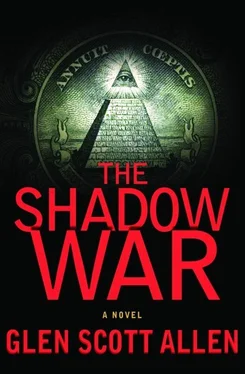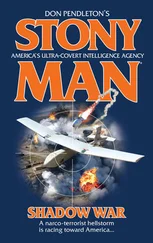Glen Allen - The shadow war
Здесь есть возможность читать онлайн «Glen Allen - The shadow war» весь текст электронной книги совершенно бесплатно (целиком полную версию без сокращений). В некоторых случаях можно слушать аудио, скачать через торрент в формате fb2 и присутствует краткое содержание. Жанр: Триллер, на английском языке. Описание произведения, (предисловие) а так же отзывы посетителей доступны на портале библиотеки ЛибКат.
- Название:The shadow war
- Автор:
- Жанр:
- Год:неизвестен
- ISBN:нет данных
- Рейтинг книги:5 / 5. Голосов: 1
-
Избранное:Добавить в избранное
- Отзывы:
-
Ваша оценка:
- 100
- 1
- 2
- 3
- 4
- 5
The shadow war: краткое содержание, описание и аннотация
Предлагаем к чтению аннотацию, описание, краткое содержание или предисловие (зависит от того, что написал сам автор книги «The shadow war»). Если вы не нашли необходимую информацию о книге — напишите в комментариях, мы постараемся отыскать её.
The shadow war — читать онлайн бесплатно полную книгу (весь текст) целиком
Ниже представлен текст книги, разбитый по страницам. Система сохранения места последней прочитанной страницы, позволяет с удобством читать онлайн бесплатно книгу «The shadow war», без необходимости каждый раз заново искать на чём Вы остановились. Поставьте закладку, и сможете в любой момент перейти на страницу, на которой закончили чтение.
Интервал:
Закладка:
In broad strokes, Benjamin outlined the investigation he and Wolfe had carried out: his discovery of the TEACUP password, the interest Jeremy had had in Myorkin at the FRN and Orlova at the RCC-and Sikorsky at Georgetown. And he confided to Anton that Wolfe thought Jeremy's death hadn't been an accident, that someone at the Foundation may have killed him to keep some aspect of his work secret. A conclusion, Benjamin said, he'd come to agree with.
"Yes, those clear parts," said Anton, not commenting on Fletcher's possible murder. "But why you? Why history guy, with Indians and Pilgrims?"
Again, Benjamin wondered how much he should tell Anton. But what was the point in asking for his help if he wasn't completely honest with him?
So he told Anton of the mysterious Ginsburg book about Bainbridge and the fake Bainbridge diary at the Morris Estate. He was even about to tell Anton of the strange symbol he'd seen in the Foundation's mural-but once again he feared it would sound outlandish, fantastical, and undermine Anton's faith in him; so he said nothing about the mural.
While Anton was mulling over what Benjamin had said, Benjamin asked a question of his own.
"Have you ever met Dr. Fletcher?"
"Oh, yes, yes. Years ago. Conference, but of smart ghouls, us guys who do this-" he pointed to the blackboard "-get paid to 'think unthinkable.' "
"Kahn's phrase?" Benjamin asked.
Anton looked surprised. "You know Kahn?"
"No, not at all," he said. "But he was mentioned the other night at dinner."
"At that place, no surprise. Almost everybody there thinking unthinkable, one way or another." The tone of teasing sarcasm was suddenly absent from Anton's voice; he sounded more than a little angry. Then he seemed to shake it off.
"And you leave after fire?" he asked.
Benjamin wondered if Anton was accusing him of abandoning Wolfe. "I wanted to stay and find out if Samuel was okay, but Gudrun… Dr. Soderbergh, she insisted there was nothing I could do, and that I should leave immediately."
"Um-hm," said Anton. "Gudrun Soderbergh. I know this name, too. Rising star. Little bit, how would you say," Anton leaned his head to one side, "bent?"
Benjamin thought for a minute. "Biased?" he asked.
Anton nodded. "Reminds me my old masters. Always knew answer before asked question. Helluva way to do research."
"I saw some photos, in the hall," Benjamin said. "You used to work for the Soviet military?"
Anton frowned. "United States has DARPA, RAND, bunch of alphabet soup guys. In USSR, instead of letters is numbers. My number was 12 Directorate, Ministry of Defense. In Kuntsevo, outside Moscow. Sometimes we get vacation, in Urals, at Kovinksky." He smiled. "Nicer winters." Anton stopped talking for a minute. "You know Russia at all?"
"Not really," Benjamin said. "I've never been there."
"Lucky you," said Anton. "Anyway, perestroika come, I go. Americans very happy with my arrival. What the hell for, I wonder. They know everything already. Anyway, here I am. I meet Samuel ten, twelve years ago. We both decide other one is son of a bitch. Get along fine."
Anton sat back in the chair, looked at him. "Now, I have three, maybe two more questions."
"All right," Benjamin said. "If I can answer them."
"We'll see. First question is, who is this Gadenhower guy, with the bees?"
Benjamin smiled. "Gadenhower was a woman. Edith Gadenhower. Her research seemed quite bizarre to us. I have no idea how it fits in with Dr. Fletcher's research."
"Is all right," Anton said. "Think I do." He stopped, squinted. "And you said ' was '?"
"Yes," said Benjamin, looking uncomfortable. "After we returned from the Morris Estate, I went to her laboratory and… well, apparently her bees had escaped…"
Anton's eyes widened. "Fletcher and Gadenhower?" Benjamin nodded. "And maybe Sam?"
"The fire was in her laboratory."
"Yes, big explosion, much chaos," Anton said, nodding to himself. "Sad, very sad." Anton's expression of grief didn't strike Benjamin as quite sincere, but he decided not to question it right now. "But hope for best, yes? Now, question number two: What did Samuel tell you about Fletcher's work?"
"He said he'd been writing about nuclear war theory for years, and that he was far ahead of anyone else with his theories."
"That I know," Anton said. "I mean, did he think it was good or bad?"
Benjamin thought back. "He said it was strange, that the way Dr. Fletcher wrote, he seemed… well, that it was almost like he didn't believe the Cold War really happened."
"Happened," Anton said. "I was there. Anyway okay, question number three. This TEACUP program, what did Samuel think it does?"
"Well…," Benjamin tried to think how to put it. "He said something about it calculating probabilities. I guess he meant probabilities of the Cold War being the sort of affair Fletcher described in his other writings. He said Fletcher was looking for flaws in the logic of the whole MAD doctrine."
Anton laughed. "Flaws like crazy bear in room," he said. "Very big, very dangerous, but nobody talks about him."
Anton put his head down for a moment, deep in thought. He stood, stretched his back, walked over to the blackboard at the other end of his study.
"See these?" he said, tapping equations on the board.
"Yes," Benjamin said.
"Three years," he said. He took a piece of chalk from the blackboard, drew an enormous X across the equations. He turned and looked at Benjamin. "All shit now." He came back and sat down, pulled the chair closer to Benjamin, pointed to Fletcher's computer. "Thank you very much, Dr. Jeremy Fletcher."
He settled back into the chair, crossed his hands in his lap, and began to speak.
"Sam wrong about TEACUP program. Or half wrong. Fletcher's TEACUP really does read tea leaves. Cold War tea leaves." He leaned forward now, put his hand on the edge of the computer. "And is really two programs."
"Two programs?" Benjamin asked.
"One half calculates probabilities about Cold War."
"You see," Benjamin began, "that's what I don't understand. We know the Cold War happened, so how can it calculate the probability of it having happened?"
Anton thought for a moment, then asked, "You know how they find planets Neptune and later Pluto?" Benjamin shook his head. "Didn't see them. Too far away. But they see Uranus does not go exactly way it should go. Something making it… wobble. They calculate, figure how big such a thing should be, where it should be. They look there… voila! They discover planets. All from the math."
Anton cleared his throat, leaned forward. "TEACUP work like that. For years Fletcher feeding it data from Cold War. Program eats data, spits out analysis. At first what it telling Fletcher not clear. He makes program better. When he gets to TEACUP 6, it's very clear what program telling him." He paused.
"Yes?" prodded Benjamin.
"Is wobble in Cold War."
"Wobble?"
"Is something making it go different way than it should go."
Benjamin leaned back on the couch. He wasn't at all sure he understood what Anton was telling him.
"I know," said Anton. "Is confusing. What way should a cold war go? But there are things more probable, and things less probable. People like Fletcher, people like me, we calculate such things. What TEACUP tells Fletcher is, things don't add up."
"What 'things'?" said Benjamin.
Anton pursed his lips, blew out air. "From what I read so far, data points at something in sixties. Something very, very strange happen. That thing, whatever was, create wobble."
"You mean, this aberration in the course of the Cold War?"
"Sam right, you smart boy. Yes, aberration. Good word."
Anton pulled the laptop closer, began typing. After a moment he turned the screen back so Benjamin could see it.
Читать дальшеИнтервал:
Закладка:
Похожие книги на «The shadow war»
Представляем Вашему вниманию похожие книги на «The shadow war» списком для выбора. Мы отобрали схожую по названию и смыслу литературу в надежде предоставить читателям больше вариантов отыскать новые, интересные, ещё непрочитанные произведения.
Обсуждение, отзывы о книге «The shadow war» и просто собственные мнения читателей. Оставьте ваши комментарии, напишите, что Вы думаете о произведении, его смысле или главных героях. Укажите что конкретно понравилось, а что нет, и почему Вы так считаете.












